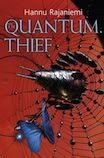2010 books

50) Hannu Rajaniemi, The Quantum Thief, 2010
Let's be honest: Hannu Rajaniemi has been particularly lucky, and I think he'd be the first to accept this. To get a three-book deal on the strength of twenty-four pages of an unfinished work goes against all advice and cajoling given to aspiring writers on the right way to go about getting your first novel published - and furthermore, he's only been writing in English since 2002. As Jo Fletcher said in her BSFA interview a couple of years ago, Gollancz wanted to cast its net a little wider than the current crop of Anglo writers, hence their recent inclusion of authors new to the British/American market such as Finland's Rajaniemi and Russia's Dmitry Glukovsky. And The Quantum Thief has had a high enough billing, named just about everywhere as the most eagerly anticipated first novel of the year.
If the entire story was filled with the competent-enough writing found in the first chapter it might be a book one could breeze through, however that first chapter - of how Jean Le Flambeur is sprung from an orbital "dilemma prison" in the outer Solar System to carry out a heist on Mars - is merely a springboard for the gosh-wow stuff to come as Le Flambeur arrives in Mars's movable city of Oubliette. Quite quickly I found myself having to give up on a lot on things that usually help a reader orienteer their way through a more straightforward SF novel: the narrative is linear and told in the present tense throughout, however at the same time Rajaniemi does not provide a logical or easily comprehensible story, and what conceptual markers we are given are often at least once-removed from our current experience, meaning that if we are to perhaps understand it all fully we may also have to work out how Rajaniemi's ideas of the future came to be placed quite where they are. There are also some key factors left in question such as the precise nature of the heist Le Flambeur is meant to carry out and the ambivalence about if, in fact, he is a real flesh and blood person or an entity of a more virtual nature, somehow encountering previous incarnations of himself. And then there's the bizarre human society he encounters on Mars, which has some concepts almost Cordwainer Smith-like in their strangeness, one of which - 'gevulot', roughly translatable as your personal privacy settings in a shared mental environment - is actually a damn clever idea with real possible future applications.
Conversely, there is for the most part a semblance of dreamlike unreality to much of what's happening. I felt the lack of solidity to some of Rajaniemi's characterisation is something he also needs to work on, and I didn't always feel entirely sympathetic with Rajaniemi's tendency to expect the reader to keep up with him by keeping his conceptual markers less easily understood - in comparison, for instance, Alastair Reynolds knows when he needs to be more reader-friendly with some of his more high-concept SF. But that's just the kind of 'quantum' SF Rajaniemi wants to write - it's not a failing, more my own lack of familiarity with some of The Quantum Thief's thematic predecessors that's the problem. But this novel still feels fully formed in its premise, and before reading it I found a particularly useful primer in John Clute's review at Strange Horizons. Despite it being rarely easy this is a dazzlingly bright novel, a magnesium flare of a novel, and I have high hopes that it can be sustained in the sequels that will no doubt extend this jigsaw puzzle of a book further into Rajaniemi's uncharted territory.